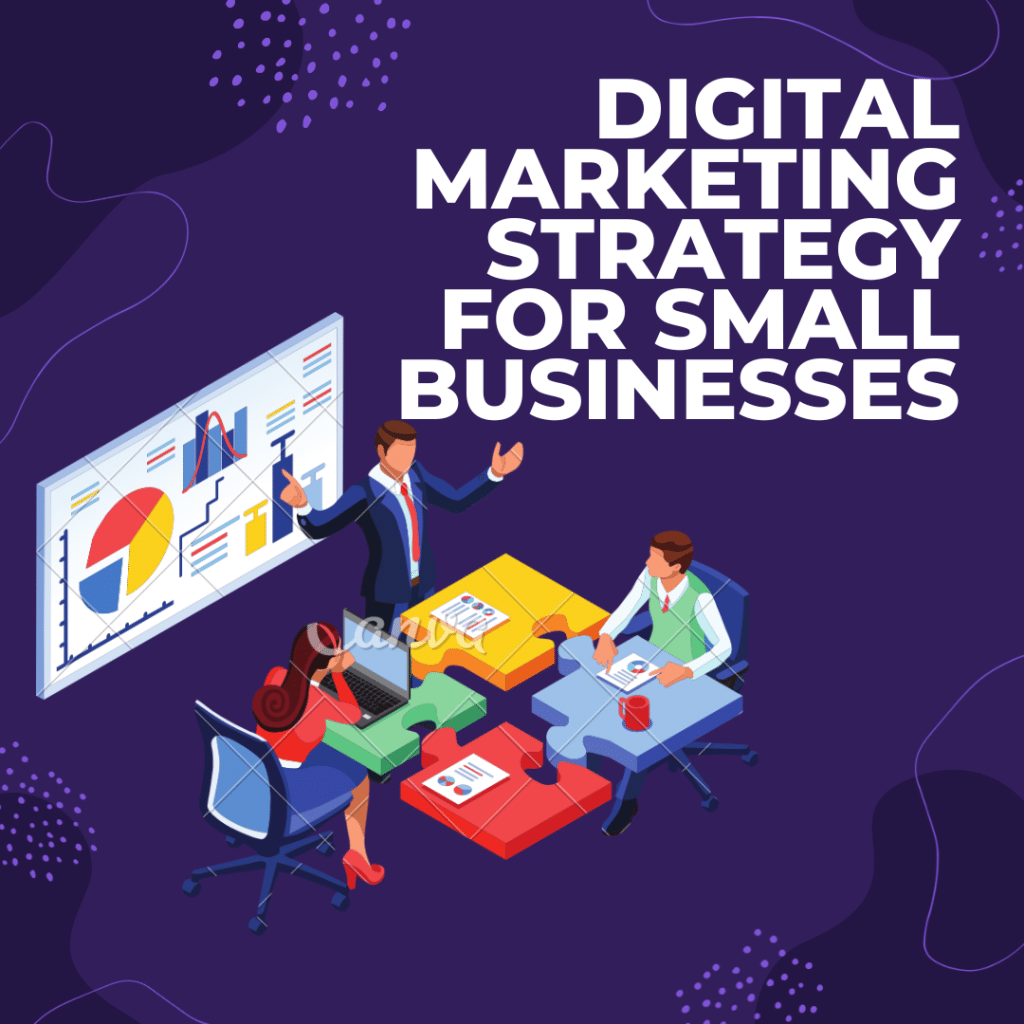
This blog post provides small businesses with tips to help them create the perfect digital marketing strategy. Effective digital marketing strategies for small businesses include creating a goal-oriented plan, understanding the customer, creating a content strategy, leveraging social media, using data and analytics, optimizing the website, and tracking progress.
In today’s digital age, having a well-crafted digital marketing strategy is crucial for small businesses to thrive and compete in the online marketplace. A well-executed strategy can help businesses reach their target audience, increase brand awareness, and drive valuable leads and conversions. In this post, we will explore the secrets to crafting the perfect digital marketing strategy for small businesses.
In the fast-paced digital landscape, small businesses need to establish a strong online presence to stand out among competitors. A digital marketing strategy serves as a roadmap to navigate this complex environment and effectively reach potential customers.
Understanding your target audience
To create an effective digital marketing strategy, you must have a deep understanding of your target audience. Start by defining your ideal customer and conducting thorough market research. Identify their demographics, preferences, and pain points to tailor your marketing efforts accordingly.
- Identify your target audience and their needs.
- Analyze current customer behaviours, demographics, and interests.
- Determine the best channels to reach your target audience.
Defining your goals and objectives
Clearly defining your goals and objectives is essential for measuring success and staying focused. Set specific, measurable, achievable, relevant, and time-bound (SMART) goals that align with your overall business objectives. Determine key performance indicators (KPIs) to track progress and make data-driven decisions.
- Define your long-term goals and desired outcomes for digital marketing.
- Set specific, measurable, achievable, relevant, and timely goals.
- Identify key performance metrics to monitor progress.
Analyzing the competition
Analyzing your competition is crucial for identifying your unique selling proposition and differentiating your business. Identify your direct and indirect competitors, analyze their digital marketing strategies, and find ways to position your brand uniquely in the market.
- Assess the digital presence of your competitors.
- Identify their strategies and tactics.
- Determine areas where you can differentiate or improve.
Choosing the right digital marketing channels
In the vast digital landscape, it’s important to select the most appropriate digital marketing channels that align with your target audience and goals. Evaluate the available channels, such as social media platforms, email marketing, search engine optimization (SEO), content marketing, and paid advertising. Understand your audience’s preferences and habits to determine the channels that will yield the best results for your small business.
- Choose the channels that are most likely to reach your target audience.
- Evaluate the effectiveness of each channel for your goals.
- Research best practices for each channel.
Creating engaging and relevant content
Content is at the heart of any successful digital marketing strategy. Develop a comprehensive content strategy that caters to your target audience’s needs and interests. Explore different content formats such as blog posts, videos, infographics, and podcasts. Incorporate storytelling techniques and personalize your content to create a genuine connection with your audience.
- Decide what types of content to use, such as videos, images, and text.
- Develop a content calendar to plan out and schedule content.
- Identify content partners and influencers.
Optimizing for search engines
Appearing in search engine results is crucial for driving organic traffic to your website. Conduct thorough keyword research to identify the terms and phrases your audience is using to find businesses like yours. Implement on-page SEO techniques, including optimizing meta tags, headers, and content structure. Additionally, focus on building quality backlinks from reputable websites to enhance your website’s visibility in search engines.
Leveraging social media platforms
Social media platforms provide excellent opportunities to engage with your target audience, build brand awareness, and drive website traffic. Establish a strong presence on platforms that are most relevant to your business and audience. Regularly share valuable content, interact with your followers, and run targeted social media campaigns to promote your products or services effectively.
Implementing email marketing campaigns
Email marketing remains one of the most effective ways to nurture leads and drive conversions. Build an email list by offering valuable content or exclusive offers. Design compelling email campaigns that are personalized and segmented based on your audience’s preferences and behaviours. Use email automation tools to streamline your campaigns and track their performance.
Tracking and measuring results
To ensure the effectiveness of your digital marketing strategy, it’s important to track and measure the results of your efforts. Utilize analytics tools such as Google Analytics to monitor key metrics, including website traffic, conversion rates, and engagement. Regularly review the data to gain insights into what is working well and what can be optimized.
- Monitor key performance metrics to measure progress.
- Analyze the data and adjust tactics as needed.
- Identify areas for improvement and optimization.
Adjusting and optimizing the strategy
Digital marketing is a dynamic field, and it’s crucial to continuously test, experiment, and adapt your strategy based on market trends and customer feedback. Stay agile and responsive to changes in the industry, and be willing to refine your approach to maximize results. Regularly review your strategy, make adjustments where necessary, and embrace innovation to stay ahead of the competition.
- Test different strategies and tactics.
- Refine content and channels based on performance.
- Make changes to increase engagement and conversions.
Crafting a perfect digital marketing strategy for small businesses requires careful planning, understanding your audience, and utilizing the right channels. By following these ten secrets, you can create a robust and effective strategy that drives your business growth, enhances brand visibility, and connects with your target audience on a deeper level.
FAQs
Q: How long does it take to see results from a digital marketing strategy?
The timeline for seeing results from a digital marketing strategy can vary depending on various factors such as your industry, competition, and the channels you’re using. Generally, it takes time to build a strong online presence and gain traction. Be patient and consistent with your efforts, and monitor key performance indicators to track progress.
Q: Is it necessary to hire a digital marketing agency for small businesses?
Hiring a digital marketing agency can be beneficial for small businesses as it brings expertise and experience to the table. However, it’s not a necessity. If you have the resources and knowledge to handle digital marketing in-house, you can develop and execute an effective strategy on your own.
Q: What budget should I allocate for digital marketing activities?
The budget for digital marketing activities varies depending on the specific goals, industry, and resources of your small business. It’s important to allocate a realistic budget that aligns with your overall marketing objectives. Consider factors such as advertising costs, content creation, software tools, and hiring professionals if needed. Start with a budget that allows you to test and optimize your strategies, and gradually increase it as you see positive results.
Q: How can I measure the success of my digital marketing efforts?
Measuring the success of your digital marketing efforts requires tracking key metrics and aligning them with your goals and objectives. Utilize tools like Google Analytics and social media insights to monitor website traffic, conversion rates, engagement, and ROI. Set up specific KPIs that are relevant to your business, and regularly review and analyze the data to make informed decisions and optimize your strategies.
Q: Are there any specific regulations or legal considerations for digital marketing?
Yes, there are regulations and legal considerations that businesses need to be aware of in digital marketing. Familiarize yourself with data protection and privacy laws, such as the General Data Protection Regulation (GDPR) in the UK and Europe. Ensure that you have proper consent mechanisms in place when collecting customer data and follow ethical practices in email marketing, advertising, and customer data handling.
Q: How often should I update my digital marketing strategy?
Digital marketing is an ever-evolving field, and it’s essential to regularly update your strategy to stay relevant and competitive. Review and evaluate your strategy at least annually, or when significant changes occur in your business, industry, or target audience. Keep track of emerging trends and technologies and be open to incorporating new strategies and tactics that align with your goals and audience preferences.
Q: Where can I learn more about digital marketing strategies for small businesses?
There are numerous online resources available to learn more about digital marketing strategies for small businesses. You can explore reputable blogs, attend webinars or workshops, and consider online courses or certifications in digital marketing. Additionally, following industry experts and joining relevant communities and forums can provide valuable insights and networking opportunities.













Leave a Comment
You must be logged in to post a comment